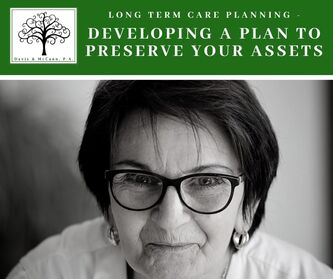 Q: My husband and I are in reasonably good health and although we are in our 60s, we have had conversations about the day when we may need to move to a nursing home facility. How can we preserve most of our assets for our children? A: There are several things you can do before one or both of you need nursing home care. Before we begin, make a comprehensive list of all your assets, including their current value, the name of the company and/or adviser, location of the asset, legal description of any real estate, minerals, wind or water rights, how ownership is titled, and current beneficiary information. This list should include any assets that are non-income producing such as inherited mineral interests, business interests, insurance policies, etc. You will need to share this information with an experienced long-term care planning attorney for their recommendations. Below is a list of options you may want to consider: 1. Meet with your long-term care planning attorney and accountant to discuss if your financial situation will allow you to begin transferring assets to your children now, either in part or in whole. Ideally, you would transfer as many assets to your children as possible at least five years before your admission to a full time nursing facility, as you will be penalized for any gifting done in the five years preceding an admission, which increases your overall out-of-pocket expense. Be aware that just because you gifted assets to your children with the expectation that they help with any financial problems you may encounter in your later years, they are under no legal obligation to comply. Gifting can be done to your children outright or in a trust. A trust is more costly, but gifting outright to your children means your newly-gifted assets are subject to your children’s possible divorce settlement, lawsuit or bankruptcy. 2. Continue to age at home and attempt to avoid nursing home care altogether. If you have not already developed a healthy routine of diet and exercise, begin immediately. Consult with your physician to see what suggestions they have to improve your odds of remaining independent at home. 3. When you need assistance, move in with one of your children. This may not be a popular option for either you or your child, but if you wish to preserve as many assets as possible from nursing home expenses, this strategy can be an answer. You may need to provide some fair compensation to your care-giving child, as they are taking on the additional responsibility of caring for you and will incur additional expenses and loss of personal freedom as a result. Consult with your long-term care planning attorney to structure compensation to the care-giving child so that it won’t be considered a gift and factored against you when computing your nursing home costs if that becomes necessary at a later date. 4. Depending on your age and your ability to pay, you may be able to purchase long-term care insurance. Long-term care insurance is expensive and may not pay the full amount of your nursing home care, but it can cover a large portion of the expense. Be sure to thoroughly research the insurance agent and company before purchasing any policy. Additionally, be sure to inquire about the policy’s inflation protection and waiting period you must incur prior to payment being issued to the nursing home. We advise getting 2-3 quotes for long-term care insurance to avoid an inferior product. 5. If you have a disabled child, you may want to consider making donations to fund a special needs trust on their behalf. These donations are not considered a gift when the nursing home calculates your expected expense. Donations to a special needs trust are irrevocable and cannot be used for the benefit of anyone other than the disabled individual for whom the trust was established until such time as the disabled individual is deceased. If you and your family have questions about long-term care planning and asset protection, please contact Davis & McCann, P. A., Dodge City, KS. We are members of Wealth Counsel, a national consortium of Estate Planning Attorneys and the National Academy of Elder Law Attorneys (NAELA). We focus our practice on providing clients with the best legal advice on estate planning, Medicaid and Long-term Care Planning, Family Business/Small Business Succession Planning, Probate, Trust Administration, Real Estate Transactions, 1031 Exchanges, and related matters. Comments are closed.
|
NEWS YOU CAN USEDavis & McCann, P. A., Archives
April 2021
Categories
All
|

 RSS Feed
RSS Feed